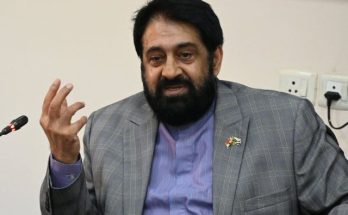Rajmohan Gandhi, author, academic and grandson of Mahatma Gandhi, has written a new biography of Mahatma Gandhi that sifts myths and legends from the real man with all his flaws and humanity.
“Mohandas: A True Story of a Man, his People and an Empire” (published by Penguin India), seeks to tell “the whole truth” about Mahatma Gandhi’s life and has been in the news for the book’s matter-of-fact description of Gandhi’s relationship with a married Bengali woman called Sarladevi.
The book demystifies Gandhi and illuminates his evolution at various stages in his life from the youthful days in London struggling with vegetarianism and the English gentleman mannerisms, experiments with satyagraha in South Africa, his stewardship of India’s freedom movement and his last days struggling with communal bloodbath unleashed by the country’s partition in 1947.
In this short interview, Rajmohan Gandhi speaks to Manish Chand about his new biography of the iconic leader, revered in India as the father of the nation, that tells the whole truth about Gandhi’s life, his temptations, struggles and the depths of his stamina and resilience that made him the man he was. “I am happy that Gandhi has been liberated from Gandhians,” says the author in this interview.
Excerpts from the interview:
Q) How is your new biography of Mahatma Gandhi different from countless others written about the great man?
A) Mohandas tells the whole truth about Gandhi’s life. This book frees Gandhi from the shroud of myths and legends that clusters around him. It’s an integrated biography. It’s different from other biographies of Gandhi for many reasons. It’s a completely chronological biography. And it’s a completely candid biography.
Q) How long did you take to write this book?
A) The idea has been in my mind for a long time. But the actual process of writing the book has taken me two and a half years.
Q) The book has been in the news for wrong reasons. A magazine used extracts from the book to play up Mahatma Gandhi’s relationship with another woman. What was it like to write about your grandfather’s relationship with Sarladevi?
A) I have tried to tell the whole truth about Gandhi’s life in this biography. This included his relationships with countless people with whom he came in contact. As for his relationship with Sarladevi, I must clarify there was no sex in that relationship. I have described the relationship as it was. The Sarla Devi incident is no secret. It was published in my book The Good Boatman 10 years ago. I haven’t plucked something out of the closet.
Read the book. Beyond that I can’t tell you much.
Q) In the course of writing this book, what new insights you gained into the mind of the man who altered the course of India’s history by opposing the British rule through non-violent weapons of satygraha and civil disobedience?
A) As I wrote the book, I was not aware of the depths of his resilience and stamina. He was tested again and again in life but he overcame it all.
Q) A Bollywood film Lage Raho Munnabhai has popularised Gandhi and put him in the public circulation again. Do you approve of such populist portrayals and interpretations of Gandhi’ life and ideas?
A) It was a good film. If it helps people rediscover Gandhi, I have no problems with it. It’s good that people are interpreting Gandhi in their own way. I am happy that Gandhi has been liberated from Gandhians.
Q) The man the world knows as the apostle of non-violence who delivered India from colonial misrule was your grandfather. How well did you know him?
A) I was lucky to have the family connection. But it’s not as though we took long walks or spent a lot of time together. But I always felt his presence around me and in myself.
Q) Gandhi had been much used and abused by the country’s political class who only pay lip service to his ideals. Do you see a change in the attitude of the political class towards Gandhi?
A) Fashions come and go. I am not bothered about it. I am an academic. I don’t know how the political class is responding to Gandhi.
Q) Gandhi used religion as an instrument of political mobilisation, but at the same time he was a deeply religious and spiritual person. How did he develop such a deep faith in God?
A) Religion was a very deep part of him, it was part of his inner reality.
Author Profile

- Manish Chand is Founder and Editor-in-Chief of India Writes Network (www.indiawrites.org) and India and World, a pioneering magazine focused on international affairs. He is CEO, Centre for Global India Insights, an India-based think tank focused on global affairs.
Latest entries
 India and the WorldFebruary 17, 2026South-by-South: Focus on people-centric solutions at India AI summit
India and the WorldFebruary 17, 2026South-by-South: Focus on people-centric solutions at India AI summit India and the WorldFebruary 7, 2026Modi hails interim India-US trade deal, Goyal says no concessions made on agriculture
India and the WorldFebruary 7, 2026Modi hails interim India-US trade deal, Goyal says no concessions made on agriculture India and the WorldFebruary 2, 2026Trump announces trade deal with India, Modi ‘delighted’
India and the WorldFebruary 2, 2026Trump announces trade deal with India, Modi ‘delighted’ India and the WorldJanuary 31, 2026Palestinian minister bats for mediatory role for India in ending Gaza conflict
India and the WorldJanuary 31, 2026Palestinian minister bats for mediatory role for India in ending Gaza conflict







